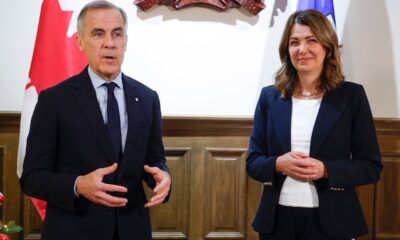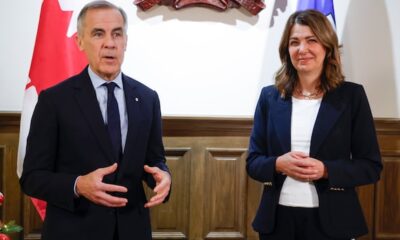Top Stories
Alberta’s Bill 11 Sparks Controversy Over Private Health Care Expansion

UPDATE: New legislation introduced in Alberta is stirring urgent concerns among health experts as it proposes to expand private health care. Bill 11, unveiled on July 17, 2023, allows doctors to operate in both public and private systems, permitting patients to pay for surgeries such as hip and knee replacements. Experts warn that critical protections for the public health system are missing, raising alarms about potential impacts on patient care.
The Alberta government asserts that this “dual practice” model will ease pressure on the public health system and decrease wait times. However, the Alberta Medical Association, representing local physicians, has voiced its dissatisfaction with the lack of consultation. “Any reform needs to be informed with the best evidence. It needs experts to actually weigh in,” stated the association’s president, Dr. Brian Wirzba, in an interview with CBC News.
Dr. Jon Meddings, a retired gastroenterologist and former dean of the University of Calgary’s Cumming School of Medicine, echoed these sentiments, cautioning, “It’s an interesting experiment to try… My worry, though, is that it is not well thought out and has not received a lot of consultation.” Meddings highlighted the existing shortage of physicians, particularly anesthetists, as a significant concern that may exacerbate wait times rather than alleviate them.
The provincial government claims this approach is modeled after successful systems in countries like Denmark, the Netherlands, the UK, and Germany. However, critics argue that Alberta’s context is fundamentally different. “Most examples used for comparison involve countries with far more physicians than we have,” Meddings said, emphasizing that Alberta struggles with a physician shortage that could hinder the dual system’s effectiveness.
In an attempt to address these concerns, Alberta’s government has announced plans to consult various stakeholders, including the Alberta Medical Association and the College of Physicians and Surgeons of Alberta. The government assured that emergency care and cancer treatments will remain publicly funded, while also proposing potential safeguards to protect the public system. This could include restrictions on the number of procedures performed privately by any one doctor.
Professor Lorian Hardcastle from the University of Calgary raised alarms about the lack of durable protections in the legislation. “The concern here is that there’s not a lot in the way of protecting the public system,” she noted. Hardcastle expressed apprehension over the government’s ability to amend critical safeguards through ministerial orders, which bypass the legislative process.
As consultations progress, Alberta’s government is set to exclude family doctors from the dual practice model initially, a move that further complicates the landscape of health care in the province. Critics remain skeptical, questioning the efficacy of merely changing payment structures without addressing deeper systemic issues. Meddings insists that for the plan to succeed, the province must lift caps on medical school training spots to increase the physician workforce.
“This is a crucial moment for Alberta’s health care system,” said Meddings. “If we don’t train enough physicians, we can’t expect to run both systems effectively.”
As Alberta forges ahead with Bill 11, the clock is ticking for essential reforms and stakeholder consultations. Stakeholders and citizens alike are urged to stay informed as developments unfold. The potential implications for patient care and the future of health services in Alberta are significant, compelling experts to call for a thorough examination of the proposed changes.
Watch for updates as this story develops further.
-

 Politics3 weeks ago
Politics3 weeks agoSecwepemc First Nation Seeks Aboriginal Title Over Kamloops Area
-

 World4 months ago
World4 months agoScientists Unearth Ancient Antarctic Ice to Unlock Climate Secrets
-

 Entertainment5 months ago
Entertainment5 months agoTrump and McCormick to Announce $70 Billion Energy Investments
-

 Lifestyle4 months ago
Lifestyle4 months agoTransLink Launches Food Truck Program to Boost Revenue in Vancouver
-

 Science5 months ago
Science5 months agoFour Astronauts Return to Earth After International Space Station Mission
-

 Technology3 months ago
Technology3 months agoApple Notes Enhances Functionality with Markdown Support in macOS 26
-

 Top Stories2 months ago
Top Stories2 months agoUrgent Update: Fatal Crash on Highway 99 Claims Life of Pitt Meadows Man
-

 Lifestyle3 months ago
Lifestyle3 months agoManitoba’s Burger Champion Shines Again Amid Dining Innovations
-

 Politics4 months ago
Politics4 months agoUkrainian Tennis Star Elina Svitolina Faces Death Threats Online
-

 Sports5 months ago
Sports5 months agoSearch Underway for Missing Hunter Amid Hokkaido Bear Emergency
-

 Politics4 months ago
Politics4 months agoCarney Engages First Nations Leaders at Development Law Summit
-

 Technology5 months ago
Technology5 months agoFrosthaven Launches Early Access on July 31, 2025





















